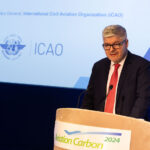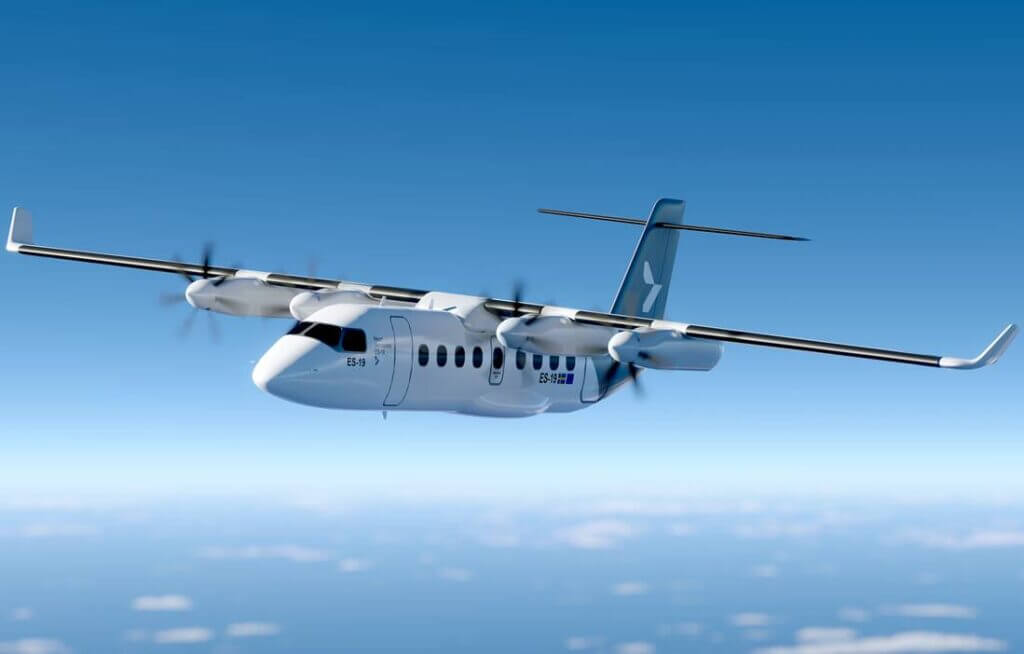Finnair has signed a letter of interest with Heart Aerospace under which the airline could purchase up to 20 of the Swedish start-up’s ES-19 electric 19-seater commuter aircraft currently under development. Heart expects the aircraft to be available for first commercial flights in 2026, and with an all-electric range of 217 nautical miles (400km), Finnair would use them on its shorter routes. The aircraft will be powered by four electric motors using automotive battery technology and be capable for operations from 750-metre-long runways. It will have a cruise speed of 180kts and a top speed of 215kts. Heart Aerospace was previously part of the Electric Air Travel in Sweden (ELISE) project and has funding from Sweden’s Vinnova innovation agency, backing from EQT Ventures for the ES-19 project and has secured €2.5 million ($3m) from the European Innovation Council Green Deal Accelerator Programme. Since 2019, Finnair has been a part of the Nordic Network for Electric Aviation to drive the development of electric flying in the region. Meanwhile, French start-up Aura Aero has unveiled a 19-seat electric aircraft aimed at the low-carbon regional transport market with an entry into service date also planned for 2026.
With a commitment to halving its net CO2 emissions by the end of 2025 and achieving carbon neutrality in 2045, Finnair’s VP Sustainability, Anne Larilahti, said the airline wanted to be actively involved in developing and implementing new technologies.
“Finnair believes electric aviation will be one of the tools for the future of flying,” she said. “It will help to promote responsible and sustainable aviation, especially on short routes, in an era where climate change will increasingly dominate the agenda. Solving the climate challenge of flying is essential so that the social and economic benefits of aviation can continue. Many of the measures require collaboration across industries in tandem with partners playing a key role in our ongoing sustainability work.”
Heart Aerospace has selected a seven-blade MT propeller to drive the ES-19’s four electric motors and the company claims the aircraft will offer 50-75% savings in fuel/energy and 90% savings in maintenance compared to an equivalent turboprop, as well as having the lowest infrastructural footprint of all modes of regional transport. For a design meant for short hops between small or large communities, noise is a big consideration, and although the ES-19 will not be completely quiet, it will be considerably less noisy than a turboprop or piston-engined aircraft, assures the company.
“Finnair’s climate goals are among the most ambitious in the airline industry and we believe that our electric aircraft can play an important role in creating zero emissions regional travel,” said Heart Aerospace CEO Andres Forslund. “We’ve been working closely together in the Nordic Network for some time. We are very impressed by the dedication and commitment of the Finnair team, and we’re thankful for their support as we take the next steps in building and certifying the ES-19.”
Initially, Heart foresees its aircraft offering point-to-point transportation between Scandinavian cities but as well as the enthusiasm from Finnair and other airlines in the Nordic Network, Heart reports similar interest for its aircraft from New Zealand, Canada, the US and the UK.
The Nordic Network for Electric Aviation (NEA) is a collaboration of 12 airlines, airport operator groups and others from six Nordic countries. It is funded by Nordic Innovation, an organisation under the Nordic Council of Ministers. NEA’s four objectives are to standardise electric aviation in the Nordic countries; develop business models for regional point-to-point connectivity between Nordic countries; develop aircraft technology for Nordic weather conditions; and create a platform for European and global collaboration.
Norway is aiming for all domestic flights to be 100%-electric by 2040 and airport operator Avinor says there are relatively few passengers per flight on the short routes between its 44 airports. The operator has announced it is joining forces with the Norwegian CAA, the Federation of Norwegian Industries and research institute SINTEF to establish an innovation and testing centre by the end of this year to promote the development of sustainable aviation. There are already several projects in the country involved in the electrification of aircraft and the new centre will aid the development of the technology. It will aim to bring together specialist national and international expertise from different sectors and make it possible for stakeholders to build a global network for collaboration on zero and low emission regional aviation.
Sweden is aiming for all domestic air travel to be fossil-fuel free by 2030 and all international flights departing from Swedish airports by 2045. Swedavia, another NEA member, has adopted a target that by 2025, 5% of all jet fuel used at its airports should be renewable. The operator has just announced that emissions under its own control at its 10 airports are now “fossil-free”.
“Swedavia’s airports are part of a larger transport system and being fossil-free now in our own operations is obviously just one milestone. We are now intensifying the work to support other companies and organisations that operate at the airports to adapt to more sustainable operations and, above all, to enable aviation’s climate change transition through investments in bio aviation fuel and by preparing our airports for electric aviation,” said Jonas Abrahamsson, Swedavia’s CEO.
Meanwhile, Toulouse-based Aura Aero, which describes itself as the “first digital and eco-efficient aircraft manufacturer”, plans to develop a 19-seater Electric Regional Aircraft (ERA) that is expected to perform its maiden flight in 2024 before entering commercial operations in 2026 in both a passenger and freighter configuration. The company is planning to power the electric engines with batteries specially developed for aeronautical use. The Occitanie region has pledged to support the project with funding of between €3-5 million.
Top image: Heart Aerospace ES-19















More News & Features
New partnerships formed to drive e-SAF production in Nordic markets
Heart Aerospace unveils full-scale 30-seat hybrid-electric aircraft demonstrator
Loganair and Heart partner on UK electric flight, while magniX and NASA unveil US e-test aircraft
Dovetail gets Australian state support and secures seaplane electric conversion deal from Norway
European aerospace supplier Aciturri takes key stake in Dovetail Electric Aviation
Hybrid electric flight pioneer Ampaire ground tests Dimensional Energy e-fuel